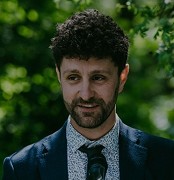Authors
Jon Roozenbeek1; 1 University of Cambridge, UKDiscussion
Russia’s invasion of Ukraine is one of the most important conflicts of the 21st century. The war began in 2014, with the annexation of Crimea and the outbreak of the Donbas War. With the start of military hostilities also came an onslaught of propaganda, to both convince and confuse audiences worldwide about the war’s historical and ideological underpinnings. In this talk, Jon Roozenbeek discusses his new book: Propaganda and Ideology in the Russian-Ukrainian War (Cambridge University Press, 2024). The book explores the role of propaganda and ideology in the ongoing conflict, focusing especialy on Donbas and its so-called ‘People’s Republics’. Roozenbeek draws on tens of thousands of historical and legal documents to analyse dominant media narratives and reconstruct the Donbas origins of the war.
Right from the start of their insurgency in 2014, the Donbas 'Republics' set up a large and well-funded propaganda machine of TV-channels, websites, and newspapers. Their purpose was to bring their story to the masses, both internally (i.e., the people living inside their territory) and externally (mainly Ukrainians living in Donbas, but also Russians and even Western audiences). This provided a huge opportunity to build support for the idea that Donbas does not belong with Ukraine.
Roozenbeek argues that this opportunity was never seized. Despite a large reservoir of ideological and historical referents to draw from, neither the Donbas 'Republics' nor Russia cared much for ideology at all, and to their peril. The massive effort to set up a sprawling media machine at home and abroad, and eight years of propaganda legitimising Russia's presence in eastern Ukraine, failed to persuade people that there was a convincing alternative to Ukrainian nationhood.
Instead, the result of this propaganda campaign was that Russians, but not Russian-speaking Ukrainians, came to view Ukraine and its government in a much more negative light, to the point where many continue to feel that the 2022 invasion was a justified course of action against an illegitimate, “fascist” regime. In occupied Donbas, few were convinced by the ideological propositions of the Donbas 'Republics', although the idea of unification with Russia became somewhat more popular. In Kyiv-controlled Donbas and everywhere else in Ukraine, however, the events of Euromaidan and the war that followed served as a catalyst for Ukrainian identity. Instead of directing their discontent at Kyiv, Russian-speaking Ukrainians settled into a civic, nationalist Ukrainian identity. Russian propaganda backfired: Ukraine is now more united than ever before.


